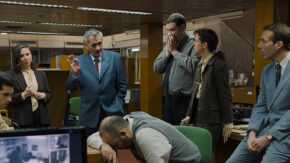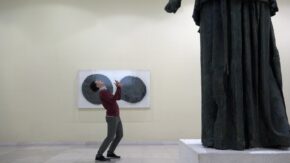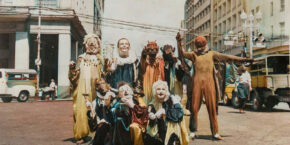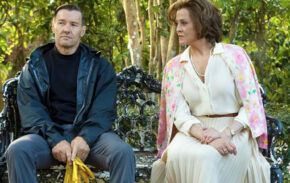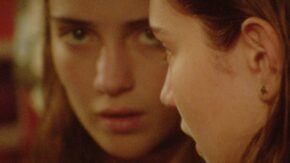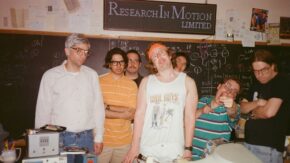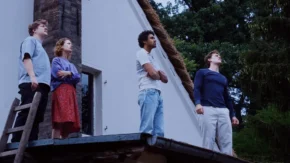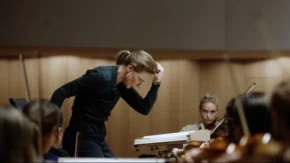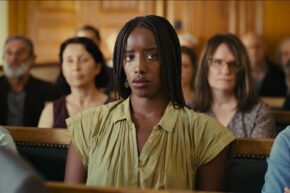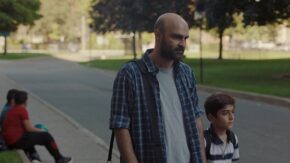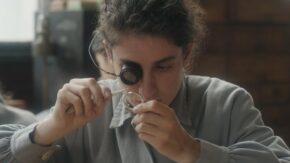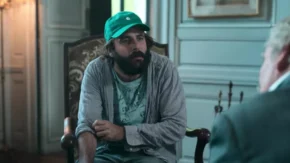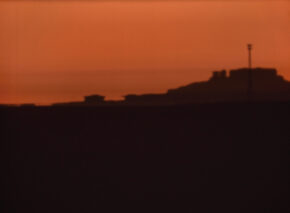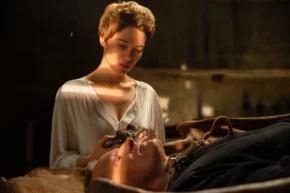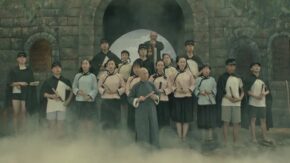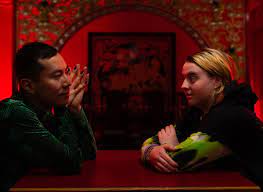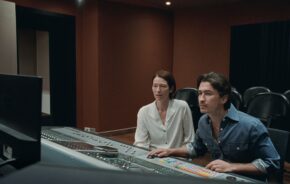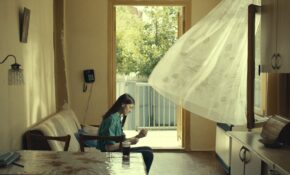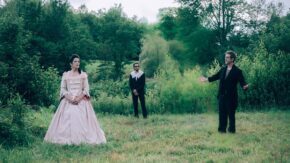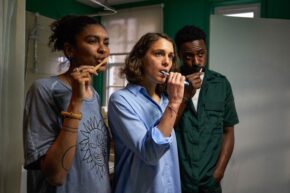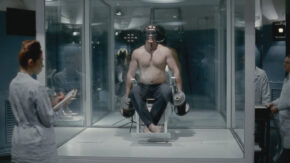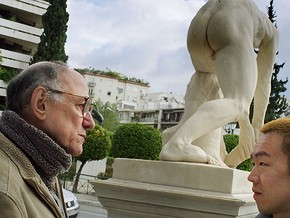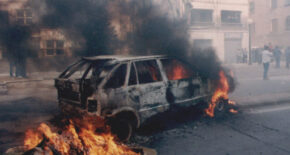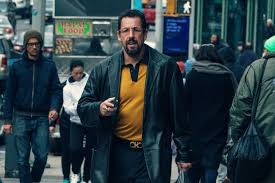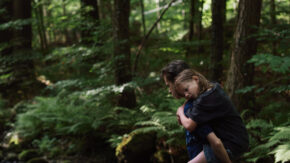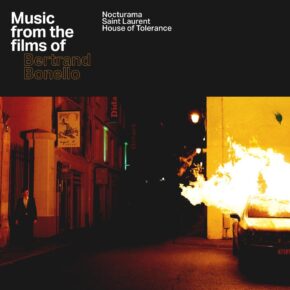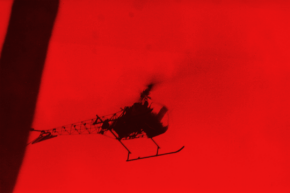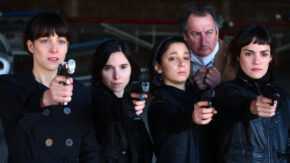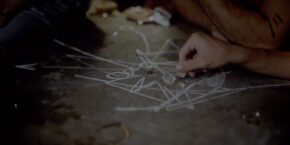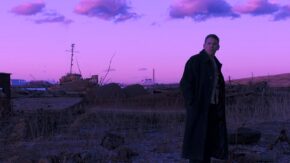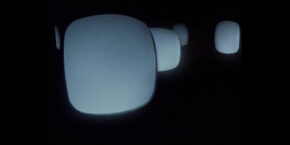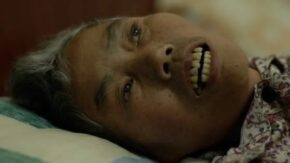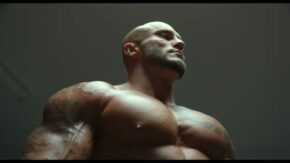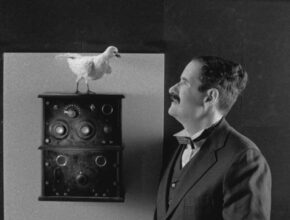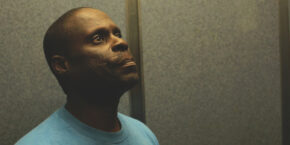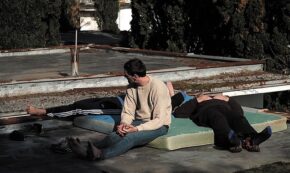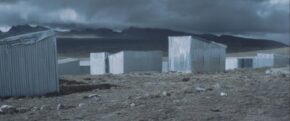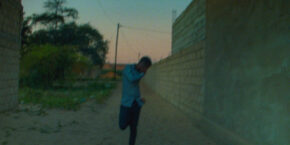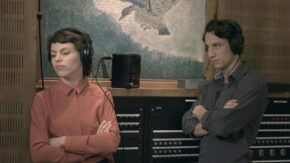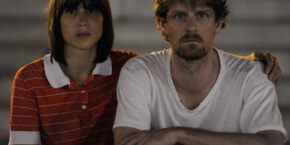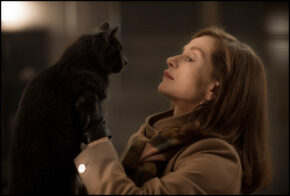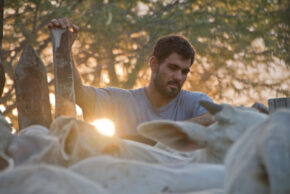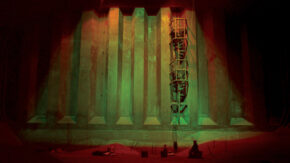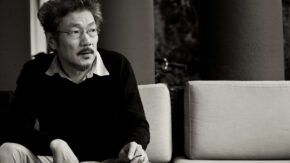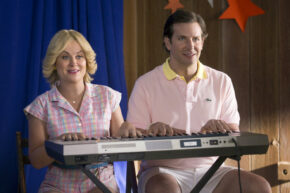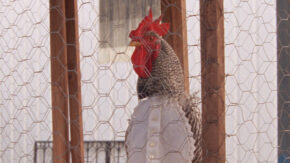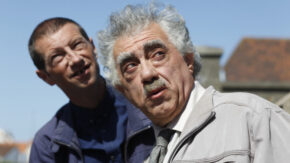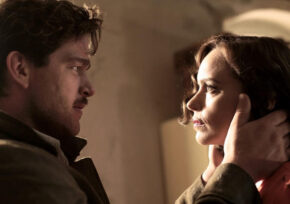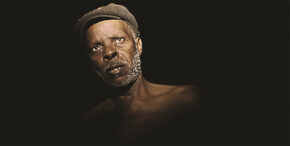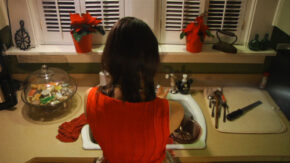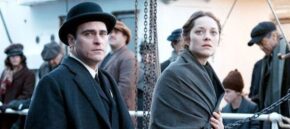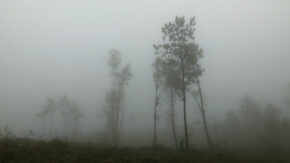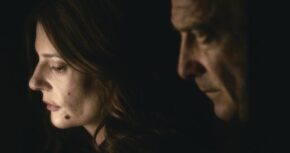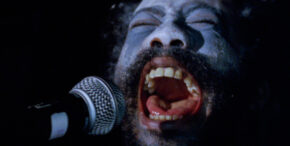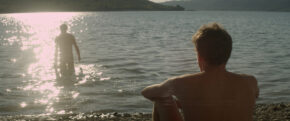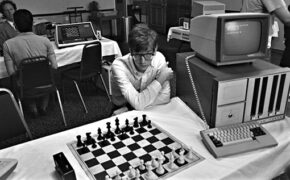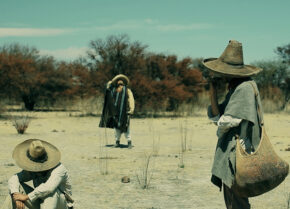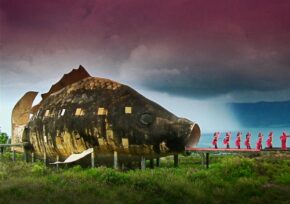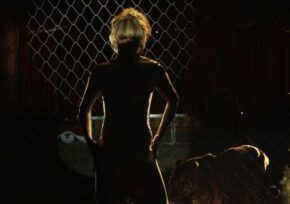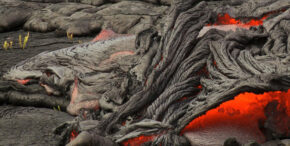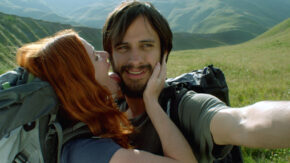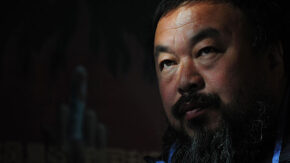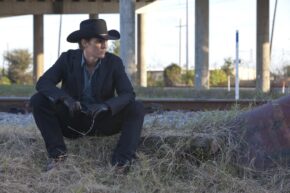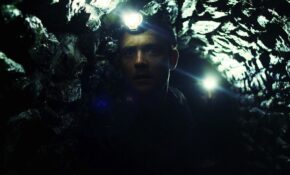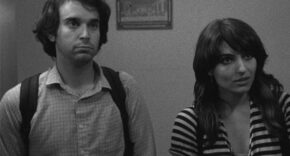Interviews
Face the Music: Hamaguchi Ryusuke on “Evil Does Not Exist”
By Beatrice Loayza | 01/18/2024 | CS97, From Cinema Scope Magazine, Interviews
Hamaguchi Ryusuke’s sublime eco-fable, Evil Does Not Exist,begins and ends with the plangent score by Ishibashi Eiko, played fortissimo over an extended tracking shot facing skywards. A forest canopy, stark and stripped of its foliage by winter’s spell, appears like latticework through which daylight passes with an eerie vibrancy.
Read More → Your Own Hall of Fame: Alex Ross Perry on “Videoheaven” and “Pavements”
By Adam Nayman | 01/18/2024 | CS97, From Cinema Scope Magazine, Interviews
Two movies, both alike in indignity, in the ’90s, where we lay our scene. Because neither Videoheaven nor Pavements—both putatively non-fictional pop-culture essay films written and directed by Alex Ross Perry—have officially been released, programmed at a festival, or even announced via trailers or posters, it’s tricky to write about their intricacies, either as standalone works or in conversation with one another.
Read More → Objects of Desire: Rodrigo Moreno on “The Delinquents”
By Jordan Cronk | 01/18/2024 | CS97, From Cinema Scope Magazine, Interviews
Until recently a somewhat forgotten figure of the New Argentine Cinema, director Rodrigo Moreno has, with The Delinquents, asserted himself as perhaps that movement’s most underestimated talent.
Read More → From the Vision to the Nail in the Coffin, and the Resurrection: Dimitris Athiridis on “exergue – on documenta 14”
By Antoine Thirion | 01/18/2024 | CS97, From Cinema Scope Magazine, Interviews
As the supervisory board is currently tasked with restructuring the documenta selection process, the fear is that the freedom traditionally granted to the exhibition’s artistic direction will be drastically constrained in order to prevent any new national “scandal” the likes of which occurred around documenta 15 in 2022.
Read More → TIFF 2023 | Do Not Expect Too Much from the End of the World (Radu Jude, Romania/Luxembourg/France/Croatia) — Wavelengths
By Jordan Cronk | 09/05/2023 | Cinema Scope Online, CS96, From Cinema Scope Magazine, Interviews, TIFF 2023
Where for many filmmakers the pandemic discouraged production or curbed creativity, it only seems to have inspired Radu Jude. Always impossible to peg, the prolific 46-year-old Romanian director has grown especially wily and provocative in recent years, embarking on a new phase in his career in which contemporary image culture and the sociopolitical absurdities of our time have become both subject of meticulous analysis and object of equally attentive ridicule.
Read More → TIFF 2023 | Pictures of Ghosts (Kleber Mendonça Filho, Brazil) — Wavelengths
By Tom Charity | 09/05/2023 | Cinema Scope Online, CS96, From Cinema Scope Magazine, Interviews, TIFF 2023
“All the cinemas went extinct,” observes a street vendor who used to sell movie posters and lobby cards behind the film distribution centre in downtown Recife, Brazil, before the bottom dropped out of the market. The kicker: this interview was recorded 30 years ago.
Read More → TIFF 2023 | Seven Veils (Atom Egoyan, Canada) — Special Presentations
By Adam Nayman | 09/05/2023 | Cinema Scope Online, CS96, From Cinema Scope Magazine, Interviews, TIFF 2023
“Nothing more Satanic or artistic has been seen on the German stage,” wrote one critic of the premiere of Salome in Ganz, Austria in 1891. In The Rest is Noise, Alex Ross describes the unveiling of Richard Strauss’ opera—which climaxed, like Oscar Wilde’s source play and the New Testament chapter before it, with the bloody decapitation of John the Baptist—as a primal scene for 20th-century music: a Grand Guignol collision of ripe classicism and atonal modernity that left geniuses and punters alike stupefied.
Read More → Master at Work: Paul Schrader on “Master Gardener”
By Will Sloan | 06/20/2023 | CS95, Features, From Cinema Scope Magazine, Interviews
Paul Schrader’s career has been eclectic enough to encompass biopics of Mishima Yukio, Bob Crane, and Patricia Hearst; adaptations of books by Ian McEwan, Russell Banks, and Nikos Kazantzakis; genre films that meet the expectations of the horror, thriller, and romance forms; and star vehicles tailored to bring out the best in icons as disparate at Richard Pryor, Richard Gere, George C. Scott, and Lindsay Lohan.
Read More → The Dream’s Dream: Lisandro Alonso on “Eureka”
By Dennis Lim | 06/20/2023 | CS95, Festivals, From Cinema Scope Magazine, Interviews, Spotlight
I write this open letter with profound frustration and disappointment over the programming decisions made for this year’s Cannes. As a filmmaker who has poured my heart and soul into creating thought-provoking and artistically daring works, I cannot help but express my vehement opposition to the relegation of my film, Eureka to the Cannes Première section.
Read More → The Girl and Her Trust: Sean Price Williams on “The Sweet East”
By Adam Nayman | 06/20/2023 | CS95, Festivals, From Cinema Scope Magazine, Interviews, Spotlight
For some critics and film-cultural commentators, The Sweet East arrives to the Quinzaine smelling of something pungent: its credits list as an executive producer one Jimmy Kaltreider, as per Politico a top aide to Peter Thiel, who himself once upon a time helped another gifted, up-and-coming director make his own politically ambivalent feature debut (Thank You For Nothing, Peter). As Williams says below, treating The Sweet East like a kind of ground zero for right-wing patronage in the history of American cinema—independent or otherwise—is selective and ahistorical to say the least, but the strident liberal-baiting on display still warrants comment.
Read More → The Battle of Waterloo: Matt Johnson and Matt Miller on <em>BlackBerry</em>
By Adam Nayman | 03/24/2023 | CS94, From Cinema Scope Magazine, Interviews
Howerton’s 40-proof, rageaholic performance skirts caricature but comes out the other end as a psychologically deft tour de force. This loosely fictionalized version of Balsillie, whose seething, pent-up contempt for partners and competitors alike emanates from some darker place (maybe even subconscious solidarity with his geeky new underlings) is a memorable and malevolent creation—the closest thing Canadian entertainment has had to a Gordon Gekko since the glory days of Traders.
Read More → Sentimental Education: Christian Petzold on <em>Afire</em>
By Darren Hughes | 03/24/2023 | CS94, From Cinema Scope Magazine, Interviews
Christian Petzold becomes bored with his own voice during press junkets. “I want to tell new stories,” he confesses with a smile. “For example, I said in one interview that the next movie is about homosexual love or something like that. I’m not very professional sometimes.”
Read More → The Pyramid of Power: Todd Field on “Tár”
By Robert Koehler | 01/10/2023 | CS93, From Cinema Scope Magazine, Interviews
After a protracted absence, Todd Field is back, and with a film that more than compensates for the wait. However, Tár shouldn’t be gauged in terms of some value system based on the number of years that Field has gone without a new movie (16, following his second feature, Little Children [2006]), any more than the gap of years between new works by Field’s mentor, Stanley Kubrick, should have been a measure for his movies.
Read More → Entre nous: Alice Diop on “Saint Omer”
By Beatrice Loayza | 01/10/2023 | CS93, From Cinema Scope Magazine, Interviews
In 2016, Alice Diop set out to the northern French town of Saint Omer to attend the trial of Fabienne Kabou, a Senegalese woman accused of killing her baby girl. The French media was enraptured by the crime; the details made for a textbook fait divers, a sensational news item spun by journalists desperate to satiate their scandal-starved readers.
Read More → Matters of Fact: Antoine Bourges on “Concrete Valley”
By Lawrence Garcia | 01/10/2023 | CS93, From Cinema Scope Magazine, Interviews
For its casting of non-professional actors within a mostly scripted narrative, Antoine Bourges’ latest feature, Concrete Valley, has already been called a docu-fiction “hybrid.” Set in the East Toronto neighbourhood of Thorncliffe Park, an initial an initial landing spot for new Canadian immigrants, the film centres on Rashid (Hussam Douhna), a former physician from Syria, who settles there with his wife, Farah (Amani Ibrahim), and their young son Ammar (Abdullah Nadaf). Apart from Ibrahim, who in the film plays a former actor, everyone who appears in Concrete Valley is an amateur performer.
Read More → Take These Broken Wings: Kelly Reichardt on “Showing Up”
By Adam Nayman | 09/27/2022 | CS92, From Cinema Scope Magazine, Interviews
“We thought we were writing a film that was partly comedic in tone. I can find a lot to laugh at with liberal arts while still believing liberal arts are super-important. Some of the situations in Showing Up are comical, but the people aren’t stereotypes—we really tried to stay away from that.”
Read More → Timely Circumstances: Cyril Schäublin on “Unrest”
By Jay Kuehner | 09/27/2022 | CS92, From Cinema Scope Magazine, Interviews
I think this is the critical question now: how do we chart our history? How do we reimagine a truer solidarity? Maybe the film allows us to imagine other possibilities.
Read More → What Is Cinema? Olivier Assayas on “Irma Vep”
By Beatrice Loayza | 09/26/2022 | CS92, From Cinema Scope Magazine, Interviews
With both versions of Irma Vep,Assayas looks tothe ruptures between the production processes and moviemaking cultures of then and now to create comedy and tragedy about what it means to want to continue the fight, the folly, that is making movies, continuously posing that vital and unanswerable question—“What is cinema?”—in order to recalibrate our perception of what it could be and what it’s not amid such endless reinvention and recontextualization.
Read More → Film/Art | Evidence Visible from a Distance: Tacita Dean on Fata Morgana
By Antoine Thirion | 09/26/2022 | Books, Columns, CS92, Film - Art, Interviews
In The Green Ray (2001), British artist Tacita Dean famously managed to capture on 16mm film the fleeting light that the sun leaves behind right at the moment when it disappears from the horizon. And, because a digital camera used by others at the same time, on the same beach, was unable to capture it, her film proves two things: one, that the green ray, despite being missed by almost all who try and see it, is not a legend; two, that only film can capture it. But the evidence is elusive, as Éric Rohmer found out while shooting Le rayon vert (1986), eventual
Read More → Wippet Good: A Conversation Between Don McKellar and David Cronenberg on “Crimes of the Future”
By Lawrence Garcia | 06/21/2022 | CS91, From Cinema Scope Magazine, Interviews
David Cronenberg’s Crimes of the Future may be marked as a “return” for the 79-year-old director in a number of respects. His first feature in eight years, it is also his first to be based on an original script since eXistenZ. In addition, Crimes sees Cronenberg revisiting, after a fashion, his 1970 film of the same name, from which he’s taken the central premise of genetic mutations in humans which have resulted in the spontaneous growth of new organs.
Read More → Send in the Clowns: Qiu Jiongjiong on “A New Old Play”
By Shelly Kraicer | 06/21/2022 | CS91, From Cinema Scope Magazine, Interviews
The brightest light in the Chinese independent cinema world at this moment is Beijing-based filmmaker and artist Qiu Jiongjiong. In an atmosphere in China of increasing surveillance and control of non-official, unauthorized artistic activity in China, Qiu, now 44, stands out as an artist with a powerful, complex, engaging vision who has found a way to continue to work without compromise. His new film, A New Old Play, premiered at the 2021 Locarno Film Festival and is now having a series of screenings in North America, after following its pickup by Icarus Films via their dGenerate Films Collection
Read More → Gross Anatomy: Véréna Paravel & Lucien Castaing-Taylor on “De Humani Corporis Fabrica”
By Blake Williams | 06/21/2022 | CS91, From Cinema Scope Magazine, Interviews
...watching this movie frequently hurts like hell, and not just physically. With a camera that furiously navigates its subjects’ myriad intestinal tracts, cranial cavities, and other, mercifully unidentifiable visceral miscellany, De Humani Corporis Fabrica is very probably the most aesthetically interoceptive movie ever made for theatrical exhibition.
Read More → Tales from the Unama’ki Hospital: Ashley McKenzie on Queens of the Qing Dynasty
By Adam Nayman | 03/21/2022 | CS90, From Cinema Scope Magazine, Interviews
Intense duets are at the centre of Ashley McKenzie’s cinema. Her 2016 debut Werewolf portrayed a pair of emotionally conjoined drug users, juxtaposing devotion and addiction as two sides of the same coin. In her follow-up, Queens of the King Dynasty,which recently premiered in Berlin’s Encounters competition,a young psychiatric patient and her volunteer caregiver form a codependent relationship with shifting emotional and power dynamics.
Read More → Pointing the Moral Index Finger: Ruth Beckermann on Mutzenbacher
By Darren Hughes | 03/21/2022 | CS90, From Cinema Scope Magazine, Interviews
Mutzenbacher, her twelfth feature and winner of the Best Film prize in the Encounters program at the 2022 Berlinale, is an unabashed provocation that dusts off a notorious, century-old pornographic text to interrogate masculinity and the strange, hand-wringing Puritanism of our modern age. As with all subjects that fall under her gaze, Beckermann observes sex, shame, desire, fear, fantasies, and transgression with a concentrated stare and a wry smile.
Read More → Show Biz Kids: Paul Thomas Anderson on Licorice Pizza
By Adam Nayman | 12/21/2021 | CS89, From Cinema Scope Magazine, Interviews
By Adam Nayman Paul Thomas Anderson loves start-up entrepreneurs and fly-by-night schemes: you could run a straight line between There Will Be Blood’s (2007) oil magnate Daniel Plainview (Daniel Day-Lewis) and Punch-Drunk Love’s (2002) humble toilet-plunger impresario Barry Egan (Adam Sandler) just as easily as you could imagine the latter signing up for one of…
Read More → I Remember Everything: Apichatpong Weerasethakul’s Memoria
By Jordan Cronk | 09/20/2021 | CS88, From Cinema Scope Magazine, Interviews
Memoria arrives amidst a flurry of activity for the 51-year-old Thai filmmaker. In addition to the feature and the book, there’s Night Colonies, his contribution to the omnibus project The Year of the Everlasting Storm (which also premiered at Cannes); a solo exhibition of his video and installation work at the IAC Villeurbanne; and a career-spanning retrospective at FIDMarseille, where the director was on hand just days after Cannes to receive the festival’s Grand Prix d’Honneur.
Read More → Can’t Get You Out of My Head: Dasha Nekrasova on The Scary of Sixty-First
By Gabrielle Marceau | 06/15/2021 | CS87, From Cinema Scope Magazine, Interviews
Stanley Kubrick’s Eyes Wide Shut (1999) was, ostensibly, a film that couched a meditation on the mundane topic of marriage and mistrust in mysterious extravagances (operatic orgies, hints of the occult, dream logic). Watching it now, it’s abundantly clear that the film is actually most trenchant in its treatment of class, corruption, and the sexual penchants of an invincible, monied elite (embodied by Sydney Pollack).
Read More → It Happened One Night: Alexandre Koberidze on What Do We See When We Look at the Sky?
By Jordan Cronk | 06/15/2021 | CS87, From Cinema Scope Magazine, Interviews
Just past the midpoint of Alexandre Koberidze’s What Do We See When We Look at the Sky? the narrative pauses for a five-minute montage of children playing European football on the blacktop of a fenced-in basketball court. Accompanied by Gianna Nannini’s 1990 FIFA World Cup anthem “Un’estate italiana,” the scene, which plays out entirely in slow motion, is at once part and parcel of this highly musical film’s many interludes and the most conspicuous of its untold number of narrative culs de sac.
Read More → The Primacy of Perception: Ramon & Silvan Zürcher on The Girl and the Spider
By Blake Williams | 04/05/2021 | CS86, From Cinema Scope Magazine, Interviews
Near the midpoint of The Girl and the Spider—Ramon and Silvan Zürcher’s overdue, much anticipated follow-up to their masterful debut feature, The Strange Little Cat (2013)—a character launches into another of the Zürcher brothers’ distinctive anecdotal monologues. Mara (Henriette Confurius), who is as close as this film gets to a protagonist, describes for her neighbour, Kerstin (Dagna Litzenberger-Vinet), an incident that occurred the previous day between herself and her newly ex-roommate (and perhaps ex-girlfriend) Lisa (Liliane Amuat). “I was in my room while Lisa was on the toilet,” she recounts. “She asked me to bring her a roll of toilet paper. Instead of giving it to her, I walked past the door from left to right, from Lisa’s point of view.” The image cuts to the scene while she recalls it, privileging us with a more objective account of the incident: a fixed shot showing Mara stand up from her desk, grab a package of toilet paper, and march past the door, her arms outstretched like a zombie.
Read More → En plein air: Denis Côté on Hygiène sociale
By Jordan Cronk | 03/25/2021 | CS86, From Cinema Scope Magazine, Interviews
No mere pandemic film (the script was largely written in 2015), Côté’s latest instead turns our current circumstances into a means for reflection, analysis, and confrontation with the very tools and convictions that have made him into one of contemporary cinema’s most prolific and unclassifiable directors. At a time when the very concepts of serious-minded filmmaking and theatrical exhibition are being called into question by streaming giants and IP managers with zero investment in the sustainability of the art form, Côté proposes that what’s needed if the cinema is to survive is not a reckoning with the notion of what is or isn’t a movie, but a re-engagement with the tenets of an author-driven cinema, achieved on its own unique terms.
Read More → The Act of Living: Gianfranco Rosi on Notturno
By Mark Peranson | 09/22/2020 | CS84, From Cinema Scope Magazine, Interviews
“The night scares me so much,” confesses a courageous Yazidi pre-teen girl to a therapist, remembering the period when she and her younger sister were captured by ISIS. Anyone who was seen crying would be killed, they were told; it turned out to be a vacant threat, but the sisters were still beaten, and now they are attempting to exorcise their memories by drawing pictures of them. Does it help? We never find out.
Read More → Reconstructing Violence: Nicolás Pereda on Fauna
By Jordan Cronk | 09/22/2020 | CS84, From Cinema Scope Magazine, Interviews
There’s a point in nearly every Nicolás Pereda film when the narrative is either reoriented or upended in some way. In the past this has occurred through bifurcations in story structure or via ruptures along a given film’s docufiction fault line. Pereda’s ninth feature, Fauna, extends this tradition, though its means of execution and conceptual ramifications represent something new for the 38-year-old Mexican-Canadian filmmaker.
Read More → The Math of Love Triangles: Athina Rachel Tsangari’s Trigonometry
By Adam Nayman | 07/04/2020 | CS83, From Cinema Scope Magazine, Interviews
The most arresting image in the new BBC Studios series Trigonometry (airing in the US this summer on HBO Max and in Canada on CBC Gem) comes in the fifth episode, when restaurateur Gemma (Thalissa Teixeira), in the middle of a difficult Nordic honeymoon getaway with her new husband Kieran (Gary Carr), goes on an evening field trip to see the Northern Lights. As Kieran sulks back at the hotel, she gazes up at a display that imbues the uncanny sensation—for the character, as well as the audience—of a planetarium-show special effect despite its you-are-there authenticity.
Read More → The Land Demands Your Effort: C.W Winter (and Anders Edström) on The Works and Days (of Tayoko Shiojiri in the Shiotani Basin)
By Mark Peranson | 06/23/2020 | CS83, From Cinema Scope Magazine, Interviews
Though the process of watching the onset of life’s end yields gut-wrenching moments, some recorded, some reconstructed, it makes little sense to extract one scene from the whole picture, as the film’s ultimate strength lies in its refusal to privilege, well, anything: an image of a tree means as much as a visit to an onsen, three people walking in the dark, a farmer hoeing her land, or a black screen with no image at all, only an intricately composed soundscape (as the quote introducing the film reads, “Until the moment you are dead you can still hear”). Make no mistake: though mortality is front and centre, this is a salute to the possibilities provided by cinema, a celebration of life.
Read More → DAU. Diary & Dialogue. Part One: A Living World
By Jordan Cronk | 06/23/2020 | CS83, From Cinema Scope Magazine, Interviews
At the press conference for the premiere of DAU. Natasha at this year’s Berlinale, director Ilya Khrzhanovsky pre-empted questions regarding the controversial methods involved in the realization of his 14-year passion project—collectively known as DAU—by contrasting the experiences of his actors with the everyday lives of their Soviet-era characters. “All the feelings [depicted in the film] are real,” he said, “but the circumstances are not real in which these feelings happen.
Read More → A State of Uncertainty: Tsai Ming-liang on Days
By Darren Hughes | 03/20/2020 | CS82, From Cinema Scope Magazine, Interviews
There’s no exact precedent for the long creative collaboration between Tsai Ming-liang and Lee Kang-sheng. In 1991, as the story goes, Tsai stepped out of a screening of a David Lynch movie and spotted Lee sitting on a motorbike outside of an arcade.
Read More → New Possible Realities: Heinz Emigholz on The Last City
By Jordan Cronk | 03/20/2020 | CS82, From Cinema Scope Magazine, Interviews
The Last City, the new film by Heinz Emigholz, begins with a confession. “And it was a straight lie when I told you that I had an image that could describe the state of my depression,” admits a middle-aged archaeologist to a weapons designer (played, respectively, by John Erdman and Jonathan Perel, who were previously seen in Emigholz's 2017 film Streetscapes [Dialogue] as a filmmaker and his analyst). “I made that up.” Part reintroduction, part recapitulation, this abrupt admission sets the conceptual coordinates for a film that, despite its presentation and the familiarity of its players, is less a continuation of that earlier work’s confessional mode of address than a creative reimagining of its talking points.
Read More → This Dream Will Be Dreamed Again: Luis López Carrasco’s El año del descubrimiento
By James Lattimer | 03/20/2020 | CS82, From Cinema Scope Magazine, Interviews
Luis López Carrasco’s dense, devious El año del descubrimiento confirms his reputation as Spain’s foremost audiovisual chronicler of the country’s recent past, albeit one for whom marginal positions, materiality, everyday chitchat, and the liberating effects of fiction are as, if not more, important than grand historical events.
Read More → Anything Is Possible: Josh and Benny Safdie on Uncut Gems
By Adam Nayman | 12/29/2019 | CS81, From Cinema Scope Magazine, Interviews
At this point, the Safdies are young masters of their own aesthetic, which was in formation at the time of Daddy Longlegs but felt more fully realized in Heaven Knows What:a roving, probing, pulsating audiovisual weave that doesn’t so much privilege pace over clarity as locate one in the other. Their movies can be exhausting, enervating, and even annoying (and Sandler, to his credit, achieves genuine annoyance in many passages here), but they’re never confusing, and the lucidity of their storytelling—which never wavers even when their characters have no earthly idea what they’re doing—has become one of contemporary American cinema’s true and distinctive marvels.
Read More → No God But the Unknown: Pietro Marcello and Maurizio Braucci on Martin Eden
By Jordan Cronk | 09/24/2019 | CS80, From Cinema Scope Magazine, Interviews
By Jordan Cronk “Of course it was beautiful; but there was something more than beauty in it, something more stingingly splendid which had made beauty its handmaiden.”—Jack London, Martin Eden Pietro Marcello’s decade-long evolution from idiosyncratic film essayist to grand narrative storyteller represents one of the most significant artistic flowerings in contemporary cinema. Recently unveiled…
Read More → I See a Darkness: Pedro Costa on Vitalina Varela
By Haden Guest | 09/24/2019 | CS80, From Cinema Scope Magazine, Interviews
A moving study of mourning and memory, Pedro Costa’s revelatory new film offers an indelible portrait of Vitalina Taveres Varela, a fragile yet indomitable woman who makes the long voyage from Cape Verde to Lisbon to attend her estranged husband’s funeral, but misses the event itself because of cruel bureaucratic delays.
Read More → Audrey II: Sofia Bohdanowicz and Deragh Campbell’s MS Slavic 7
By Adam Nayman | 03/26/2019 | CS78, Features, From Cinema Scope Magazine, Interviews
Canadians don’t do sequels. Or at least we don’t do them that often: Don Shebib went Down the Road Again again in 2011, and Bruce McDonald got the band back together for Hard Core Logo 2 (2010); commercially oriented hits like Fubar (2002) and Bon Cop, Bad Cop (2006) have been profitable enough to justify follow-ups.
Read More → To Thine Own Self Be True: Angela Schanelec on I Was at Home, But…
By Giovanni Marchini Camia | 03/26/2019 | CS78, Features, From Cinema Scope Magazine, Interviews
It’s outrageous that it should have taken this long for Angela Schanelec to make it into the Competition of the Berlinale—and ironic, given that it was a review of her film Passing Summer (2001), published in Die Zeit, that originated the term “Berliner Schule.”
Read More → Ghost Operas: Music from the Films of Bertrand Bonello
By Sean Rogers | 01/02/2019 | CS77, Features, From Cinema Scope Magazine, Interviews
By Sean Rogers “I think that to write the music for that scene was also his way to tell it…You almost have the impression that his script for the scene is the colour and the sound, that’s it.” Bertrand Bonello is here referring to a scene from David Lynch’s Twin Peaks: Fire Walk with Me…
Read More → Soft and Hard: Claire Denis on High Life
By Adam Nayman | 01/02/2019 | CS77, Features, From Cinema Scope Magazine, Interviews
By Adam Nayman There is a shot of an infant being carried by its father in Claire Denis’ L’intrus (2004) that may be the most rapt and tender image of its kind I’ve ever seen in a film. The first ten minutes of the director’s new High Life offer an extension and an elaboration of…
Read More → Encore: Dora García’s Segunda vez
By Michael Sicinski | 01/02/2019 | CS77, Features, From Cinema Scope Magazine, Interviews
By Michael Sicinski 1. This is the story of a repetition. General Juan Perón was elected President of Argentina for the first time in 1946, and served two terms of office, from June 4 of that year through September 21, 1955. From 1946 through 1952, his first term, he ruled with his wife Eva at…
Read More → The Land of the Unknown: Roberto Minervini on What You Gonna Do When the World’s on Fire?
By Jordan Cronk | 01/02/2019 | CS77, Features, From Cinema Scope Magazine, Interviews
By Jordan Cronk Writing for Cinema Scope in the winter of 2017, director Roberto Minervini reflected on a new wave of philistine cinema in America. For Minervini, this “covert-yet-not-so-subtle nationalistic, reactionary” brand of filmmaking—exemplified by the likes of Denis Villeneuve’s Sicario (2015)—is a prime example of how Hollywood, operating under the guise of liberal nonpartisanship, contributes…
Read More → Teller of Tales: Mariano Llinás on La Flor
By Jordan Cronk | 09/28/2018 | CS76, From Cinema Scope Magazine, Interviews
By Jordan Cronk “Some will say I reinvented the wheel. Yes, I’d say, I reinvented the wheel.”—La Flor, Episode 4 To begin, a question: What exactly is La Flor? It’s a pertinent query, albeit one with no easy answer, so let’s break it down. The first thing to know about La Flor is that, yes,…
Read More → Mass Ornaments: Jodie Mack on The Grand Bizarre
By Blake Williams | 09/28/2018 | CS76, From Cinema Scope Magazine, Interviews
By Blake Williams “For the passionate spectator, it is an immense joy to set up house in the heart of the multitude, amid the ebb and flow of movement, in the midst of the fugitive and the infinite. To be away from home and yet to feel oneself everywhere at home.”—“The Painter of Modern Life,”…
Read More → Everything Transitory Is But an Image: Andrea Bussmann on Fausto
By Adam Cook | 09/26/2018 | CS76, From Cinema Scope Magazine, Interviews
By Josh Cabrita and Adam Cook “Most people want to be kings and queens, but not enough want to be Faust.” —Jean-Luc Godard, Le livre d’image When Goethe wrote his Faust, adapting the German legend about a scholar who makes a pact with the Devil to attain total knowledge, could he have foreseen how incisive…
Read More → I Like America and America Likes Me: An Interview with Lars von Trier
By Mark Peranson | 07/02/2018 | CS75, From Cinema Scope Magazine, Interviews
By Mark Peranson Cinema Scope: One of the biggest stories in Cannes this year is your physical return and the controversy that is associated with it, but, call me crazy, I want to talk about the film that you made, which is about a serial killer. Last time out, in Nymphomaniac (2013), you made a…
Read More → Apt Pupil: Bi Gan on Long Day’s Journey Into Night
By Blake Williams | 07/01/2018 | CS75, From Cinema Scope Magazine, Interviews
By Blake Williams “If the cinema isn’t made to express dreams or everything that in waking life has something in common with dreams, then it has no point.”—Antonin Artaud, “Sorcellerie et cinéma” (ca. 1928) Cinema, however realist it may ever strive to be, is synonymous with dreaming. Fundamentally past-tense, after the fact; industrially and institutionally…
Read More → Whatever Happened to Lizzie Borden?
By Christoph Huber | 03/16/2018 | CS74, From Cinema Scope Magazine, Interviews
By Christoph Huber “This fight will not end in terrorism and violence. It will not end in a nuclear holocaust. It begins in the celebration of the rites of alchemy. The transformation of shit into gold. The illumination of dark chaotic night into light. This is the time of sweet, sweet change for us all.”…
Read More → Paul Schrader: Deliberate Boredom in the Church of Cinema
By Alex Ross Perry | 03/16/2018 | CS74, From Cinema Scope Magazine, Interviews
By Alex Ross Perry Paul Schrader’s First Reformed is his fourth film in five years, following the reinvention-spawning masterpiece The Canyons (2013), the failed, compromised 2014 Nicolas Cage thriller Dying of the Light (recently repurposed, remixed, and reclaimed as a new film entitled Dark), and the gonzo, goofy Nicolas Cage thriller Dog Eat Dog (2016).…
Read More → Giving Credibility to the Universe: Hélène Cattet & Bruno Forzani on Laissez bronzer les cadavres
By Christoph Huber | 12/15/2017 | CS73, From Cinema Scope Magazine, Interviews
By Christoph Huber “The .22 bullet tore a tiny hole into the canvas. The detonation was marginally louder than the crack of a whip. In the valley a crow protested. Luce emitted a short, husky laugh quite similar to the sound of the crow.” Thus begins Laissez bronzer les cadavres!, the first novel by Jean-Patrick…
Read More → Sightsurf and Brainwave: Blake Williams’ PROTOTYPE
By Michael Sicinski | 12/15/2017 | CS73, From Cinema Scope Magazine, Interviews
By Michael Sicinski Blake Williams is a multi-dimensional character. A writer whose work has frequently graced the pages of this magazine, he is also an academic and a film artist. And, as a filmmaker, he has no time for flatness. No filmmaker since Ken Jacobs has been so consistently committed to exploring the aesthetic potentials…
Read More → The Land of Terrible Legends: Narimane Mari on Le fort des fous
By Jordan Cronk | 09/28/2017 | CS72, From Cinema Scope Magazine, Interviews
By Jordan Cronk Narimane Mari’s 2013 film Bloody Beans concludes with a query: “What is worth more, to be or to obey?” These words, invoked in succession by a handful of the film’s adolescent protagonists, are taken from Antonin Artaud’s “Petit poème des poissons de la mer,” an allegorical 1926 text by the French dramatist…
Read More → Inner and Outer Space: Wang Bing Talks About Mrs. Fang
By Daniel Kasman | 09/28/2017 | CS72, From Cinema Scope Magazine, Interviews
By Daniel Kasman & Christopher Small An old face—skin drawn tautly over jaw and cheekbone, thinning grey hair, eyeballs quivering like tadpoles—is the central image in Wang Bing’s Golden Leopard winner Mrs. Fang. The naked, sober image of this face, which belongs to Fang Xiuying, the film’s bedridden 68-year-old protagonist, is studied at length and…
Read More → The New Workout Plan: Denis Côté’s Ta peau si lisse
By Adam Nayman | 09/28/2017 | CS72, From Cinema Scope Magazine, Interviews
By Adam Nayman William K.L. Dickson’s Sandow (1894) is a three-part documentary study of the Prussian muscleman Friedrich Wilhelm Muller, who adopted the more flamboyant nom de plume after he dodged the draft and joined the circus. Sandow’s placement on undergraduate film studies curriculums the world over owes to its unique historical value: it was…
Read More → Rossellini’s War Trilogy: Neorealism or Historical Revisionism?
By Celluloid Liberation Front | 06/23/2017 | CS71, Features, From Cinema Scope Magazine, Interviews
By Celluloid Liberation Front Two years before Roberto Rossellini started shooting Rome, Open City on January 18, 1945, the famed Italian director had just completed another war trilogy. Inaugurated with the 1941 navy flick The White Ship, followed a year later by A Pilot Returns, and crowned in 1943 with Man of the Cross, the…
Read More → Would You Like to See a Magic Trick?: Basma Alsharif’s Ouroboros and its Contexts
By Phil Coldiron | 06/23/2017 | CS71, Features, From Cinema Scope Magazine, Interviews
By Phil Coldiron “À quiconque a perdu ce qui ne se retrouve Jamais, jamais!” —Charles Baudelaire On a clear day in the spring of this year, having fallen under the geometric spell of an exhibition of new work by the photographer Sara Cwynar, a young woman found herself on the wrong uptown train and was…
Read More → Dusting the Corners: Luke Fowler’s Restorative Histories
By Michael Sicinski | 06/22/2017 | CS71, Features, From Cinema Scope Magazine, Interviews
By Michael Sicinski “Why are Luke Fowler’s films so hard to get a grip on?” That’s the question that critic/Berlinale programmer James Lattimer posed regarding the Scottish artist and filmmaker last year in a piece for MUBI’s Notebook. While Lattimer concludes that Fowler’s unique style results in “loose, deliberately fuzzy essays” that give the viewer…
Read More → Electroshock Therapy: Matthew Rankin on The Tesla World Light
By Jason Anderson | 06/22/2017 | CS71, Features, From Cinema Scope Magazine, Interviews
By Jason Anderson International devotees of Canuck pop-cultural arcana may pride themselves on knowing every single line that Drake ever uttered on Degrassi: The Next Generation, but there’s another treasure that Canadians thus far have been able to keep for themselves. These are the Heritage Minutes, a series of government-made, bilingual 60-second shorts for television…
Read More → First Do No Harm: Hugh Gibson on The Stairs
By Angelo Muredda | 03/24/2017 | CS70, From Cinema Scope Magazine, Interviews
By Angelo Muredda Early in Hugh Gibson’s The Stairs, we meet Marty, a recovering addict working as a social worker for drug users in Toronto’s Regent Park. A loquacious eccentric who clearly relishes the Aaron Sorkin-inflected walk-and-talk of his onscreen introduction, Marty seems equally comfortable leading a tutorial on packing safe injection kits at work…
Read More → Cinema Concrete: Dane Komljen’s All the Cities of the North
By Robert Koehler | 03/24/2017 | CS70, From Cinema Scope Magazine, Interviews
By Robert Koehler There are several ways to measure the greatness of Dane Komljen’s first feature work, All the Cities of the North, and one of them is simply asking people who’ve just seen it if they can compare it to anything else. I’ve played this little game with viewers, many asked randomly, after festival…
Read More → Something, Everything: Manuela De Laborde on AS WITHOUT SO WITHIN
By Blake Williams | 12/19/2016 | CS69, Features, From Cinema Scope Magazine, Interviews
By Blake Williams First a title card, clean and neat; the film’s four-word name split and divided between the upper- and lower-centre regions of a large, red rectangle, itself surrounded by a thick black border. Cut to darkness. Mammoth blue grains of emulsion wriggling through near-black crevasses beside veins of softer blues and the occasional…
Read More → The Working Hour: Salomé Lamas’ Eldorado XXI
By Michael Sicinski | 12/19/2016 | CS69, Features, From Cinema Scope Magazine, Interviews
By Michael Sicinski Salomé Lamas’ experimental feature Eldorado XXI is a film that we might call a “modified ethnography,” in the sense that Lamas has gone to a particular location—La Rinconada y Cerro Lunar settlement in the Peruvian Andes—to observe both the landscape and those individuals who populate it. But as with a number of…
Read More → Super-Ornithologist: João Pedro Rodrigues’ Birdman
By Robert Koehler | 12/19/2016 | CS69, Features, From Cinema Scope Magazine, Interviews
By Robert Koehler It was a reminder of how much we desperately need stories and storytelling to make sense of the world when I saw one guy punch another guy in the face one evening on the UCLA campus in 1977. The guy getting punched had become all agitated arguing for his favourite book at…
Read More → Artifact Bonfire: Ken Jacobs and Reichstag 9/11
By Daniel Kasman | 12/19/2016 | CS69, Features, From Cinema Scope Magazine, Interviews
By Daniel Kasman I stopped looking at video footage of September 11, 2001, a long time ago as I find these moving images of expressionistically variable quality and cubist perspective anguished, frightful, and daunting. Two years after the attack, I moved to New York City, and over time I became a part of the city—or…
Read More → From the Other Side: Exiled in Trumpland
By Roberto Minervini | 12/19/2016 | CS69, Features, From Cinema Scope Magazine, Interviews
I moved to the United States on October 22, 2000, to work as an IT consultant in New York City just a few days before the infamous presidential election that saw George W. Bush lose the popular vote and ultimately “defeat” Al Gore, after the conservative Supreme Court controversially halted the Florida recounts.
Read More → Weapon of Flesh: Shiota Akihiko’s Wet Woman in the Wind and the Return of Roman Porno
By Christoph Huber | 09/26/2016 | CS68, Features, From Cinema Scope Magazine, Interviews
By Christoph Huber It could have been another quiet day in the country, but it wasn’t meant to be: Shiota Akihiko’s Wet Woman in the Wind starts with an idyllic shot of a forest glade dappled with sunlight, the only hint at the absurd convolutions to come being a chair positioned incongruously at the edge…
Read More → The Wanderer: Eduardo Williams’ The Human Surge
By Leo Goldsmith | 09/05/2016 | Cinema Scope Online, CS68, Features, From Cinema Scope Magazine, Interviews, TIFF 2016
By Leo Goldsmith From the bottom of the sea, across a city, and into the stratosphere; from the moon, through a deserted city, deep into the forest, and down into a hole in the Earth. Argentinian director Eduardo Williams’ recent short films—Could See a Puma (2011) and I forgot! (2014)—follow strange trajectories both over and…
Read More → Sehnsucht: Ruth Beckermann on The Dreamed Ones
By Andrea Picard | 09/04/2016 | Cinema Scope Online, CS68, Features, From Cinema Scope Magazine, Interviews, TIFF 2016
By Andréa Picard “This longing, these sighs from soft pillows, I am happy, endlessly happy, to be so filled with this thought. Maybe you will come, maybe you will walk through the door and take from me. I am so ready to give.”—Ingeborg Bachmann, Letters to Felician (July 6, 1945) Cinema is synonymous with longing.…
Read More → Saying Something: The Films of Angela Schanelec
By Blake Williams | 09/03/2016 | Cinema Scope Online, CS68, Features, From Cinema Scope Magazine, Interviews, TIFF 2016
By Blake Williams “The everyday is platitude (what lags and falls back, the residual life with which our trash cans and cemeteries are filled: scrap and refuse); but this banality is also what is most important. It brings us back to existence in its very spontaneity and as it is lived—in the moment when, lived,…
Read More → The Rules of the Game: Paul Verhoeven’s Elle
By Adam Nayman | 09/02/2016 | Cinema Scope Online, CS68, Features, From Cinema Scope Magazine, Interviews, TIFF 2016
By Adam Nayman In Elle, Michèle (Isabelle Huppert) slaps her adult son in the face, sleeps with a hammer under her pillow, deliberately smashes into her ex-husband’s car and later pepper-sprays him, accidentally crashes her own car, buys a gun, and forces a much younger male employee at her video-game company to show her his…
Read More → Era Extraña: Lewis Klahr on Sixty Six
By Jordan Cronk | 03/21/2016 | CS66, From Cinema Scope Magazine, Interviews
By Jordan Cronk “I’ve been listening to all the dissension/ I’ve been listening to all the pain/ And I feel that no matter what I do for you/ It’s going to come back again”––Leonard Cohen, “Minute Prologue” An anthology film in 12 chapters, Lewis Klahr’s animated mosaic Sixty Six is both greater than the sum…
Read More → The Only Luxury: An Interview with Ted Fendt
By Dan Sullivan | 03/21/2016 | CS66, From Cinema Scope Magazine, Interviews
By Dan Sullivan For the past few years, Ted Fendt has been one of the busiest under-the-radar figures in film exhibition in New York: a projectionist at the Film Society of Lincoln Center, he is also the city’s go-to live-subtitler of rare, unsubtitled prints of French films, and ranks among its most active moviegoers. But…
Read More → Body Politic: Gabriel Mascaro on Neon Bull
By Jose Teodoro | 12/21/2015 | CS65, From Cinema Scope Magazine, Interviews
By José Teodoro Neon Bull begins with a languid lateral pan across widescreen-friendly corral fencing, bulls lazing one atop another spied between the slats. This image is soon followed by that of a plane of parched mud littered with coloured rags and dismembered mannequins. Later we see a woman waxing her pubic hair in the…
Read More → Two Years at Sea: An Interview with Mauro Herce
By Jay Kuehner | 12/21/2015 | CS65, From Cinema Scope Magazine, Interviews
By Jay Kuehner A post-industrial trance film set aboard a phantom-like freighter drifting toward shipwreck or oblivion, Dead Slow Ahead materializes its eponymous nautical telegraph into an abstract state of voluptuous inertia. The merchant ship Fair Lady is adrift in unspecified international waters, her crew diminished (if not devoured) by the machinery of the vessel…
Read More → Infinite Worlds Possible: Hong Sangsoo’s Right Now, Wrong Then
By Roger Koza | 09/22/2015 | CS64, From Cinema Scope Magazine, Interviews
Essay By Roger Koza Interview by Francisco Ferreira & Julien Gester Set in Suwon, about 30 kilometres south of Seoul, Hong Sangsoo’s Golden Leopard-winning masterpiece is divided into two sections which are almost exactly the same. Even the opening credits are repeated once the film reboots an hour in, though with one subtle yet noticeable…
Read More → Necessary Means: Isiah Medina on 88:88
By Phil Coldiron | 09/22/2015 | CS64, From Cinema Scope Magazine, Interviews
By Phil Coldiron One of the enduring problems of the cinema is that André Bazin’s answer to the question, “What is it?” is so convincing that he was able to pass off an ontology of one of its modes, namely realism, as a sufficient description of the whole. Of course, the issue hardly begins with…
Read More → Notes on Camp: An Interview with David Wain
By Adam Nayman | 09/22/2015 | CS64, From Cinema Scope Magazine, Interviews
By Adam Nayman In the exciting climax of Wet Hot American Summer: First Day of Camp—the eight-part Netflix prequel to David Wain’s 2001 cult comedy about a Jewish summer camp circa 1981 infested with horny teenagers portrayed by paunchy grown-up comedians—the counsellors face down none other than Ronald Reagan (played by co-creator Michael Showalter). The…
Read More → TIFF 2015 | Cinema Scope 64 Preview | Right Now, Wrong Then (Hong Sangsoo, South Korea)—Masters
By Roger Koza | 09/01/2015 | Cinema Scope Online, Interviews, TIFF 2015
Repetition and Difference: Hong Sangsoo on Right Now, Wrong Then By Roger Koza Interview by Francisco Ferreira & Julien Gester Originally published in Cinema Scope 64 (Fall 2015). Set in Suwon, about 30 kilometres south of Seoul, Hong Sangsoo’s Golden Leopard-winning masterpiece is divided into two sections which are almost exactly the same. Even the…
Read More → Cock and Bull Stories: Miguel Gomes on Arabian Nights
By Mark Peranson | 06/23/2015 | CS63, From Cinema Scope Magazine, Interviews
By Mark Peranson Cinema Scope: Miguel Gomes, you need no introduction to the readers of this magazine. Here you are back in Cannes with a three-part, six-hour epic inspired by the Arabian Nights. There’s general consensus among critics that it’s one of the best things here, but some people seem concerned that in today’s distribution…
Read More → Lost in the Funhouse: A Conversation with Guy Maddin and Evan Johnson on The Forbidden Room and Other Stories
By Mark Peranson | 03/26/2015 | CS62, From Cinema Scope Magazine, Interviews
By Mark Peranson Like being sloppily slapped by a wet salmon to the point of submission, such is the impact of Guy Maddin and Evan Johnson’s inventive, audacious, and outright hilarious tour de force whatzit. Sure to ride roughshod over numerous territories following its premieres in Sundance and the Berlinale Forum, The Forbidden Room takes…
Read More → Circumnavigating Cinema: Kidlat Tahimik’s Balikbayan #1 Memories of Overdevelopment Redux III
By Daniel Kasman | 03/26/2015 | CS62, From Cinema Scope Magazine, Interviews
By Adam Cook and Daniel Kasman To be upfront, we weren’t familiar with Kidlat Tahimik. Multiple tips led us to seeing his new film, Balikbayan #1 Memories of Overdevelopment Redux III, at its premiere in the Forum section of the Berlinale, in the way that one is often pushed towards unknown filmmakers: on the recommendations…
Read More → Dead Meat: Bruno Dumont’s P’tit Quinquin
By Michael Sicinski | 12/18/2014 | CS61, Features, From Cinema Scope Magazine, Interviews, Top Ten Films 2014
By Michael Sicinski P’tit Quinquin, the four-part miniseries that Bruno Dumont made for the ARTE network, had its world premiere earlier this year at Cannes as a 200-minute theatrical feature before screening to a record audience on French television in September. (It screened as a special presentation in the Fortnight, sort of a P’tit Quinquinzaine,…
Read More → Of Human Bondage: Peter Strickland on The Duke of Burgundy
By Jose Teodoro | 12/18/2014 | CS61, Features, From Cinema Scope Magazine, Interviews
By José Teodoro Given the painstakingly retro stylings of its opening title sequence (with ostentatious credits for lingerie and perfumes, the latter attributed to one Je Suis Gizelle) and the imprimatur of producers Ben Wheatley, Andy Starke, and Amy Jump, there are at first reasons to suspect that The Duke of Burgundy will keep its…
Read More → The Face of Another: Christian Petzold’s Phoenix
By Adam Nayman | 12/17/2014 | CS61, Features, From Cinema Scope Magazine, Interviews, Top Ten Films 2014
By Adam Nayman Nina Hoss has one of the great faces in cinema, so it’s perverse to see it swaddled in gauze at the beginning of Phoenix. Strapped into the passenger seat of a car being driven over the Swiss border into Germany at the end of World War II, her Nelly Lenz is a…
Read More → Who Can Tell of the Heroic Deeds of Israel?: Nadav Lapid’s The Kindergarten Teacher
By Jay Kuehner | 12/17/2014 | CS61, Features, From Cinema Scope Magazine, Interviews, Top Ten Films 2014
By Jay Kuehner. Films are often described as being “poetic,” but beyond the suggestion of a certain undefined lyricism, it is not entirely clear just what this means. Unrequited love, for example, might be given supple expression through an ambient absence, or the cruel passage of time might be suggested by the fixity of the…
Read More → Quest for Happiness: A Conversation with Peter von Bagh
By Boris Nelepo | 09/16/2014 | CS60, From Cinema Scope Magazine, Interviews
By Boris Nelepo and Celluloid Liberation Front 9/22/2014: We were saddened to hear of Peter von Bagh’s death on September 17, 2014. In Citizen Peter, last year’s book on Peter von Bagh (edited by Antti Alanen and Olaf Möller) published in his native Finland, the object of study is dubbed “a Renaissance man,” which is…
Read More → Pacifico’s Heights: Simone Rapisarda Casanova on The Creation of Meaning
By Jason Anderson | 09/16/2014 | CS60, From Cinema Scope Magazine, Interviews
By Jason Anderson Simone Rapisarda Casanova says that there is a Borges story so deeply embedded in his brain that only a lobotomy could remove it. Such a surgery would be suitably Borgesian in and of itself, but he should be safe from it in the meantime. The story, he explains, is “The Aleph,” a…
Read More → Beautiful Games: Matías Piñeiro on The Princess of France
By Andrew Tracy | 09/02/2014 | CS60, From Cinema Scope Magazine, Interviews
By Andrew Tracy While the opening proper of Matías Piñeiro’s The Princess of France will (or at least deserves to) be one of the most celebrated sequences of any film this year, the voiceover prologue that precedes it is perhaps the more telling in terms of Piñeiro’s ongoing project: a call-in radio show host announces,…
Read More → L’avventura: Pedro Costa on Horse Money
By Mark Peranson | 09/01/2014 | CS60, From Cinema Scope Magazine, Interviews, Top Ten Films 2014
By Mark Peranson I walked with a zombie I walked with a zombie I walked with a zombie Last night Horse Money, the first new “fiction” feature from Pedro Costa in almost a decade, begins with a silent montage of poignant photographs from the Danish-born Jacob Riis of New York tenement dwellers in the…
Read More → Declarations of Independence: A Conversation Between Alex Ross Perry and Joel Potrykus
By Cinema Scope | 06/25/2014 | CS59, Features, From Cinema Scope Magazine, Interviews
I first encountered Joel Potrykus’ Ape (2012) when I was a jury member for the Filmmakers of the Present competition at Locarno. As it was the sole American narrative film in the selection, my curiosity was piqued before the festival even began. Ape was a revelation, and the jury agreed: we awarded Joel the Best…
Read More → Diary of a Mad Housewife: Robert Greene’s Actress
By Adam Nayman | 06/25/2014 | CS59, From Cinema Scope Magazine, Interviews
By Adam Nayman “I tend to break things,” says Brandy Burre early on in Actress, and Robert Greene’s film gives her plenty of opportunities to validate this claim. An aggressively stylized profile of a former ensemble player on The Wire who now lives with her husband and two young children in sleepy Beacon, New York,…
Read More → Words Matter: James Gray on The Immigrant
By Adam Nayman | 06/06/2014 | Cinema Scope Online, Interviews
By Adam Nayman I won’t write too much about The Immigrant here, as Adam Cook has already ably reviewed the film (in Cinema Scope 55) and because for once, James Gray doesn’t seem to lack for champions closer to home than his usual Parisian cheering section. That The Immigrant has been warmly embraced by the…
Read More → Time and Space: Moments with Lois Patiño
By Aaron Cutler | 12/12/2013 | CS57, From Cinema Scope Magazine, Interviews
By Aaron Cutler “Upon entering men in landscape and landscape in men the eternal life of Galicia was created,” reads a quote by famed Galician nationalist Alfonso Daniel Rodriguéz Castelão at the start of Lois Patiño’s film Costa da Morte. Made in collaboration with photographer Carla Andrade, the film goes on to explore the relationship…
Read More → Architecture of Desire: Joanna Hogg’s Exhibition
By Paul Dallas | 12/12/2013 | CS57, From Cinema Scope Magazine, Interviews
By Paul Dallas Le Corbusier’s famous assertion that a house must be “a machine for living” acquires new force in Exhibition, an exquisitely crafted and thrillingly ambiguous chamber drama by the British writer-director Joanna Hogg. Set almost entirely within a well-appointed modernist townhouse in London, Hogg’s film, which explores connections between space and psyche, is…
Read More → No Sanctuary: Claire Denis on Bastards
By Jose Teodoro | 10/10/2013 | Cinema Scope Online, Interviews
By José Teodoro The first image of Bastards, a gauzy curtain of nocturnal drizzle, falls on us like a heavy dream—or rather, it drags us under. The rain raineth on a whole lot of eerily beautiful gloom during the wordless, disorienting opening sequence: a solitary older man gazes out a window, seemingly resigned to some…
Read More → Shine a Light: Ben Rivers and Ben Russell’s A Spell to Ward Off the Darkness
By Michael Sicinski | 08/30/2013 | CS56, From Cinema Scope Magazine, Interviews
By Michael Sicinski With its very title, A Spell to Ward Off the Darkness is a film that announces itself as being in league with forces not entirely of this world. Nevertheless, its makers are two of the leading lights of contemporary experimental cinema precisely because of their pellucid examination of the world around them.…
Read More → The Beauty of Horror and the Horror of Beauty: An Encounter with Albert Serra
By Mark Peranson | 08/30/2013 | CS56, From Cinema Scope Magazine, Interviews
By Mark Peranson “It is not necessary for the public to know whether I am joking or whether I am serious, just as it is not necessary for me to know it myself.”—Salvador Dalí, Diary of a Genius (1964) Cinema Scope: Let me repeat what I wrote about your film, namely that for me Story…
Read More → Sex, Death, and Geometry: A Conversation Between Alain Guiraudie and João Pedro Rodrigues on L’inconnu du lac
By Cinema Scope | 06/24/2013 | CS55, Features, From Cinema Scope Magazine, Interviews
João Pedro Rodrigues: I’ve watched L’inconnu du lac twice, and now realize that the film takes place over ten days. Alain Guiraudie: Yes, you’re right. Rodrigues: Only on the ninth day do you omit the establishing shot of the parking lot, which introduces all the other nine days. Was this shot already planned when you…
Read More → One-Man Band: A Conversation with Matt Johnson About The Dirties
By Cinema Scope | 06/24/2013 | CS55, Features, From Cinema Scope Magazine, Interviews
By Calum Marsh “This movie’s gonna be so good,” raves a zealous teenaged filmmaker to two young kids at the beginning of The Dirties. “It’s set in the club from Irreversible [2002].” The children are understandably baffled by the reference, and their reaction is genuine—they don’t know they’re acting in a film at all. The…
Read More → Middlegame: An Interview with Andrew Bujalski
By Phil Coldiron | 03/21/2013 | CS54, From Cinema Scope Magazine, Interviews
By Phil Coldiron Here’s a human point: this little introduction to the following interview with Andrew Bujalski on the occasion of the Sundance and Berlin premieres of his extraordinary new film, Computer Chess, has given me more sleepless nights than just about anything I’ve ever written. In a way that very few films have ever…
Read More → After-School Special: Joseph Kahn’s Detention
By Adam Nayman | 03/21/2013 | CS54, From Cinema Scope Magazine, Interviews
By Adam Nayman No American filmmaker in recent years has put his money where his mouth is like Joseph Kahn, the director of music videos for artists including Britney Spears, Destiny’s Child, Eminem, Gwen Stefani, Katy Perry, Kylie Minogue, Mariah Carey, Lady Gaga, U2, and Wu-Tang Clan. These are big names, and for the part…
Read More → Forced Exchange: Nicolás Pereda and Jacob Schulsinger on Killing Strangers
By Adam Cook | 02/15/2013 | Cinema Scope Online, Interviews
By Adam Cook Now in its fourth year, DOX:LAB is an initiative of Copenhagen’s CPH:DOX documentary film festival that pairs a European and non-European filmmaker together to collaborate on a film via a CPH:DOX development grant. The 2012 program brought together Mexican-Canadian filmmaker Nicolás Pereda with Denmark’s Jacob Secher Schulsinger, who has worked as an…
Read More → Antoine Bourges on East Hastings Pharmacy
By Michael Vass | 01/11/2013 | Cinema Scope Online, Interviews
By Michael Vass When Paris-born filmmaker Antoine Bourges moved from Montréal to Vancouver in 2006, he ended up living and working near the infamous Downtown Eastside neighbourhood. This led Bourges to make a pair of films in the community with its residents: the short Woman Waiting (2010), and the medium-length 2012 feature East Hastings Pharmacy,…
Read More → No Sound Is Innocent: Peter Strickland’s Berberian Sound Studio
By Jason Anderson | 12/16/2012 | CS53, From Cinema Scope Magazine, Interviews
By Jason Anderson A cunningly crafted, slyly satirical, and deeply unsettling tale of a movie sound engineer losing his grasp on reality amid the obsolete tools of cinema’s analogue age, Berberian Sound Studio immediately takes a place near the top of a very short list of feature films that prioritize matters (and mysteries) of sound…
Read More → Find Me Guilty: Joshua Oppenheimer’s The Act of Killing
By Adam Nayman | 12/16/2012 | CS53, From Cinema Scope Magazine, Interviews
By Adam Nayman Like most other documentaries about people who are certifiably insane, The Act of Killing raises questions about the exploitation of its subjects. Namely: Is it even possible to exploit men who freely and in some cases gleefully admit to the torture, rape, and murder of untold scores of their countrymen? And also:…
Read More → He and “I”: Joaõ Pedro Rodrigues and Joaõ Rui Guerra da Mata on The Last Time I Saw Macao
By Aaron Cutler | 12/16/2012 | CS53, From Cinema Scope Magazine, Interviews
By Aaron Cutler “Goodbye Lady from Macao” reads a newspaper headline at the end of Joaõ Pedro Rodrigues and Joaõ Rui Guerra da Mata’s short Red Dawn (2011), an unnervingly straightforward view of fish and livestock being sliced open in Macao’s Red Market. This tribute to the recently departed Jane Russell, the sultry wonder who…
Read More → Golden Girls: Sean Baker’s Starlet
By Adam Nayman | 09/11/2012 | CS52, From Cinema Scope Magazine, Interviews
The opening shot of Sean Baker’s fourth feature Starlet is beautiful, and not just because it (eventually) rests on Dree Hemingway. Underneath dreamy, faintly menacing music by Manual, we fade up on a mottled wall cast in sunlight, with some sort of tousled mass peeking out slightly from below. That little blonde outcropping is our…
Read More → Wandering in Vienna: Jem Cohen and the Adventure of Museum Hours
By Robert Koehler | 09/11/2012 | CS52, From Cinema Scope Magazine, Interviews
“Kunsthistorisches. It’s the big old one.” This is how Vienna’s massive, venerable, lovely and, indeed, elderly central art museum is termed in Jem Cohen’s Museum Hours, and it neatly sums up the film’s warm, casual attitude toward weighty cultural institutions while serving as a way of reframing formerly perceived paragons of elitism in a more…
Read More → Lost in the Moment: Peter Mettler on The End of Time
By Jason Anderson | 09/11/2012 | CS52, From Cinema Scope Magazine, Interviews
After travelling through such far-flung sites as Detroit, Hawaii, India, and the geek-tacular labyrinth that is CERN’s Large Hadron Collider near Geneva, Peter Mettler’s latest documentary finally leaves the material world altogether, arriving at a ripping pool of sounds and images that rates as the most splendiferously trippy sequence of the filmmaker’s career. Yet there’s…
Read More → Terror Incognita: Julia Loktev on The Loneliest Planet
By Jay Kuehner | 06/24/2012 | CS51, From Cinema Scope Magazine, Interviews
By Jay Kuehner Despite the elemental grandeur of its setting and the irony of its title, The Loneliest Planet (2011) hinges neither on the cruelty of nature nor of civilization, but on the betrayals endemic to interpersonal relationships. A deceptively minimal and decidedly haunted pastoral tour that follows a couple of affianced Americans trekking through…
Read More → Film Criticism After Film Criticism: The J. Hoberman Affair
By Mark Peranson | 04/18/2012 | CS50, From Cinema Scope Magazine, Interviews
By Mark Peranson In a subconscious sense, the impassioned cris de coeur that rippled through the internet following the shocking, but not surprising, dismissal of J. Hoberman from his position as senior film critic for the Village Voice on January 4, 2012, are evidence of an anxiety that springs from the changing nature of the…
Read More → Documentary Is Just One of My Tools: The Digital Film Activism of Ai Weiwei
By J.P. Sniadecki | 12/20/2011 | CS49, From Cinema Scope Magazine, Interviews
By J.P. Sniadecki The celebrity status of Chinese artist, architect, and social activist Ai Weiwei has been steadily constructed over the past decade via his multimedia provocations and large-scale interventions in both art and politics. Combining a bold conceptual vision with a staunch belief in the artist’s role as social critic, his works have aimed…
Read More → Bad Billy: William Friedkin on Killer Joe
By Olivier Pere | 12/20/2011 | CS49, From Cinema Scope Magazine, Interviews
By Olivier Père With The French Connection (1971), The Exorcist (1973), Sorcerer (1977), Cruising (1980), and To Live and Die in L.A. (1985), to cite some of his most famous films, William Friedkin has made a deep impact on contemporary American cinema, establishing himself as one of the most talented and uncompromising of the New…
Read More → Hammer Horror: Ben Wheatley’s Kill List
By Adam Nayman | 12/20/2011 | CS49, From Cinema Scope Magazine, Interviews
By Adam Nayman MAJOR SPOILERS AHEAD The claw hammer that makes mulch of an amateur pornographer’s skull in the midpoint money shot of Kill List is a blunt instrument wielded with purpose. It’s the perfect avatar for Ben Wheatley’s style in his astonishing second feature. Working with cinematographer Laurie Rose and editor Robin Smith, both…
Read More → Gravity’s Grayscale: Alex Ross Perry’s Cinema of Deaffirmation
By Michael Sicinski | 09/28/2011 | CS48, From Cinema Scope Magazine, Interviews
By Michael Sicinski One could make a long, sad list of everything wrong with American independent cinema today, but one of the worst things about so much of it is just how desperate it is to be liked. There’s an ugly tendency to simultaneously flatter an audience’s supposed good taste and breeding (“look at you,…
Read More → 


